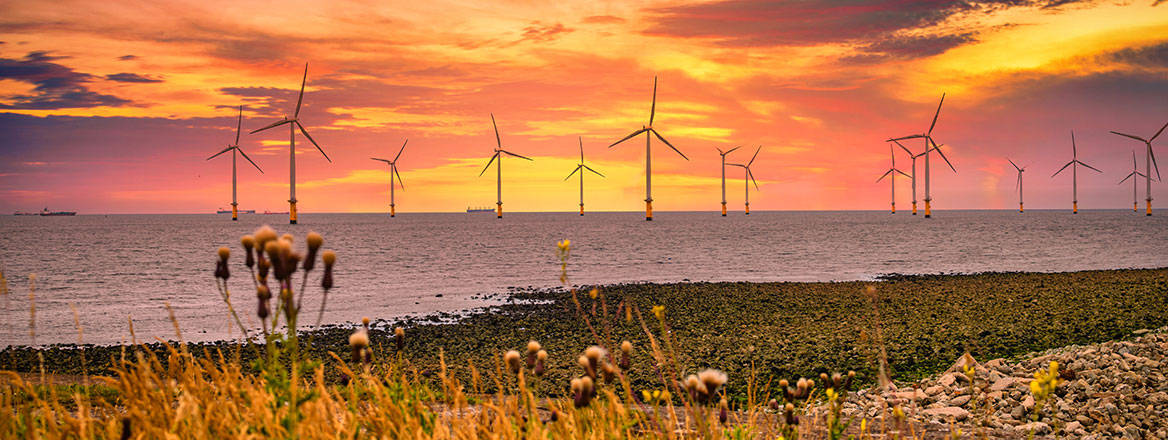NATO and the North Sea: Securing the Green Energy Transition
With the region's importance set to be amplified by the green transition, North Sea states and stakeholders must develop new ideas and strategies to ensure its future security.
The North Sea is back on the security agenda. Barely a month passes without news of Russian activity around its critical infrastructure. The Nord Stream Baltic pipeline sabotage in September 2022 and the challenges in identifying the culprits have highlighted the insecurity of dispersed maritime assets and their connectivity in the region.
During the Cold War, the North Sea was a key strategic front, with NATO countries – especially the UK – prioritising the interception of Russian forces. Since then, it has often been regarded merely as a European lake, with concerns limited to marine conservation, fishery regulation, and dwindling hydrocarbon reserves. However, with the resurgence of the Russian threat, Brexit and growing reliance on offshore energy, the strategic importance of the region has fundamentally changed.
The North Sea is increasingly becoming the key strategic region for European energy security and a source of wealth and employment. While fossil fuel extraction has been crucial for Norway, the UK and indirectly the EU since the 1960s, the green transition will significantly amplify the region's importance. North Sea countries have declared the goal of producing at least 300 gigawatts of offshore wind energy by 2050, equivalent to 200 nuclear power plants at sea. Scotland and the Netherlands host small-scale tidal projects, with the region becoming an experimental zone for tidal and wave energy technologies. These all entail undersea electricity connections, and a growing number of cables connect national grids into a Europe-wide energy market.
This growth requires expansion and decentralisation of critical infrastructure, including fabrication facilities, support services and energy grids, in order to accommodate the shift to distributed energy generation. Policy rhetoric is now heavily invested in the region driving jobs growth, with a recent European Commission foresight report predicting a net increase in green employment across the bloc.
The North Sea is increasingly becoming the key strategic region for European energy security and a source of wealth and employment
Furthermore, the North Sea holds enormous promise for ‘green hydrogen’ production from electrolysis of seawater using excess wind energy. It also hosts the world's largest producer of ‘blue hydrogen’ – Linde, based in the UK. Given that the process of making blue hydrogen involves splitting hydrocarbons, its sustainability relies on carbon capture and storage (CCS) of the resulting CO2. Crucially, the North Sea has a significant role to play in developing CCS, providing key sites where emissions can potentially be pumped into old gas and oil fields or other geological formations.
The North Sea is also crisscrossed by undersea data cables, which are vital not only to the region but also to global data traffic. Energy and data cable landing points are scattered along the North Sea coast. These are all vulnerable to accidental or deliberate damage. Because much of this infrastructure relies on remote monitoring and control, cybersecurity is inseparable from its operation.
Amid the establishment of new infrastructure, traditional maritime activities continue to thrive. Congested shipping lanes supply the three busiest ports in the region – Rotterdam, Antwerp and Hamburg – and multiple others. Fishing continues to provide vital (and politically important) employment for coastal communities.
Consequently, the North Sea represents a critical maritime space for its nine adjacent countries, as well as being important for those beyond due to its role in European electricity generation and data connectivity. It is a testbed for technologies central to the green energy transition.
It is crucial to recognise that North Sea security encompasses more than just guarding against external threats such as Russia
The safety of this critical infrastructure increasingly worries policymakers in Norway, the UK, the EU and NATO. Given the level of interdependency, no country benefits from tackling this challenge on its own. However, with the UK's departure from the EU and Norway's non-membership, NATO currently provides the only common framework to address critical maritime infrastructure protection. In response, NATO has established a coordination cell to address this issue.
However, critical maritime infrastructure protection exceeds the purview of the military and requires the active involvement of civilian maritime security forces, maritime authorities, regulatory agencies and the infrastructure industry in terms of information sharing, expertise and protective measures. Thus, it is imperative to develop new ideas and strategies for collaboration among North Sea states and stakeholders. The participation of the UK and Norway in EU activities may present complications, necessitating the development of formats and strategies that lie outside the formal EU framework. This could involve establishing a regional strategy forum, information-sharing mechanisms, and the creation of joint standards for the region – work for which the Council of the Baltic Seas States could be an important template.
It is crucial to recognise that North Sea security encompasses more than just guarding against external threats such as Russia. The infrastructure in the region is exposed, dispersed and difficult to patrol, and so is also susceptible to accidents, failures and other critical challenges. Crises in one sector can quickly cascade into others, potentially disrupting the old and new technologies deployed in the area. Therefore, North Sea security must encompass not only exogenous threats but also endogenous risks and the resilience of the entire infrastructure. The stakes are not limited to geopolitical security alone; they also encompass energy security, cybersecurity, economic security and environmental security. In essence, the security of the North Sea is intricately tied to the security of the green energy transition.
The views expressed in this Commentary are the authors’, and do not represent those of RUSI or any other institution.
Have an idea for a Commentary you’d like to write for us? Send a short pitch to commentaries@rusi.org and we’ll get back to you if it fits into our research interests. Full guidelines for contributors can be found here.
WRITTEN BY
Christian Bueger
Andrew Neal
- Jim McLeanMedia Relations Manager+44 (0)7917 373 069JimMc@rusi.org



